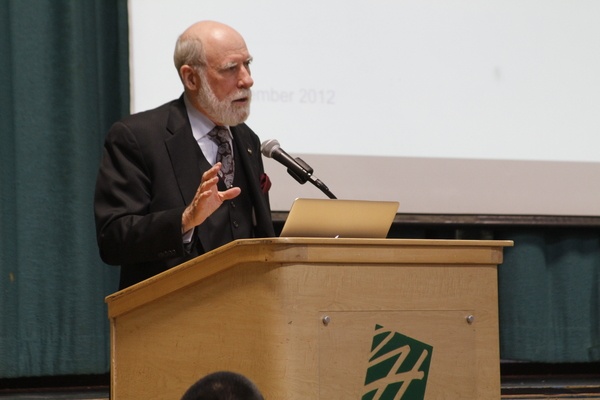Vint Cerf, a celebrated computer scientist lauded as one of the “fathers of the Internet,” spoke to a special upper school assembly on Friday to share his views on where he believes the Internet is headed and the moving story of how technology granted his deaf wife the ability to hear.
Cerf came to Harker after being invited by Zina Jawadi, founder of the Disability Awareness Program, and his visit was cosponsored by the Computer Science department. Jawadi is hearing impaired and reached out to Cerf to help her fellow students understand the challenges hearing-impaired people face.
Along with Bob Kahn, Cerf began the original design work of what would eventually become the Internet in 1973. It was turned on Jan. 1, 1983, with 400 computers on the network. “There are now nearly a billion computers on the network, and those are just the ones you can see with domain names and Internet addresses and the like,” he said. Accounting for “episodically connected” computers and Internet-enabled mobile devices, the number most like climbs to two or three billion.
Now Google’s chief Internet evangelist, Cerf works to bring the Internet to more people around the globe. “I have about four billion more people to convert, so I could use help,” he joked. “If any of you are interested in getting more Internet out there, I am happy to engage your services.”
Cerf recapped the recent evolution of the Internet, including milestones such as the release of version 6 of Internet Protocol (IPv6) and the addition of non-Latin characters to domain names. “This is not a fixed design. This is a very flexible, very evolvable system,” he said. “It was designed to be that way.”
This design allows virtually anyone to invent new ways to change how the Internet works. “There’s nothing stopping any of you from designing a new set of protocols for operating right on top of the basic Internet layer for developing new applications,” Cerf said. “So don’t be shy about saying, ‘Gee, I could do a better job. I could build a better design for various parts of the Internet.’”
As the tech pioneer demonstrated, Internet capability can now be found in many day-to-day items previously not thought to be pieces of modern computing, such as picture frames that can download and display images uploaded onto a website, light bulbs that can be turned on and off remotely and a refrigerator that identifies the items it contains and (provided those items contain radio-frequency identification chips) displays recipes on a door-mounted screen.
One recent innovation that Cerf expects to proliferate in the future is sensor networks, which use small censors that are powered by AA batteries and can be used to monitor changes in environmental elements such as temperature and sound. “They can be extended to be used for security purposes, not just for environmental sensing and control,” he said. “But more important, they provide an opportunity for feedback about our use of resources and what the consequences are of resource consumption.”
A supporter of ‘Net neutrality and a believer in the openness of the Internet as a primary reason for its success, Cerf expressed his concern over the control some governments wish to exert over the Internet and the dominance of major broadband providers. “My position and the position of Google has always been to keep the Internet as open as we possibly can,” he said. “The reason the Internet has become so interesting and valuable is that it has been easy for people to put new applications up on the ‘Net. You don’t have to get permission from every Internet service provider in the world or even from the local government … to try a new application.”
Toward the end of his talk, Cerf touched on a topic of great personal importance to him. Sigrid, his wife, had been deaf for more than 50 years before receiving cochlear implants in 1996. In a particularly emotional moment, he recalled receiving a phone call from his wife after the devices were activated, speaking to her on the phone for the first time in their 30 years of marriage. “Of course, it wasn’t a very deep conversation, but it was pretty amazing,” he said. “So by the time I got home, I discovered I had a 50-year-old teenager. I couldn’t get her off the phone.”
Sigrid Cerf also learned how to enhance the experience of watching movies on an airplane by routing the audio directly into the speech processor and using optical detectors that are supported at certain movie theaters. She also uses strategically placed FM transmitters that allow her to hear audio from almost anywhere in a room. “Her favorite trick is to leave the FM transmitter at the dinner table when she goes to the powder room, and then she listens to the conversation,” Cerf said, eliciting laughter from the audience. “So we have to warn all of our guests that there are no secrets.”
Read the Winged Post/Talon story here
